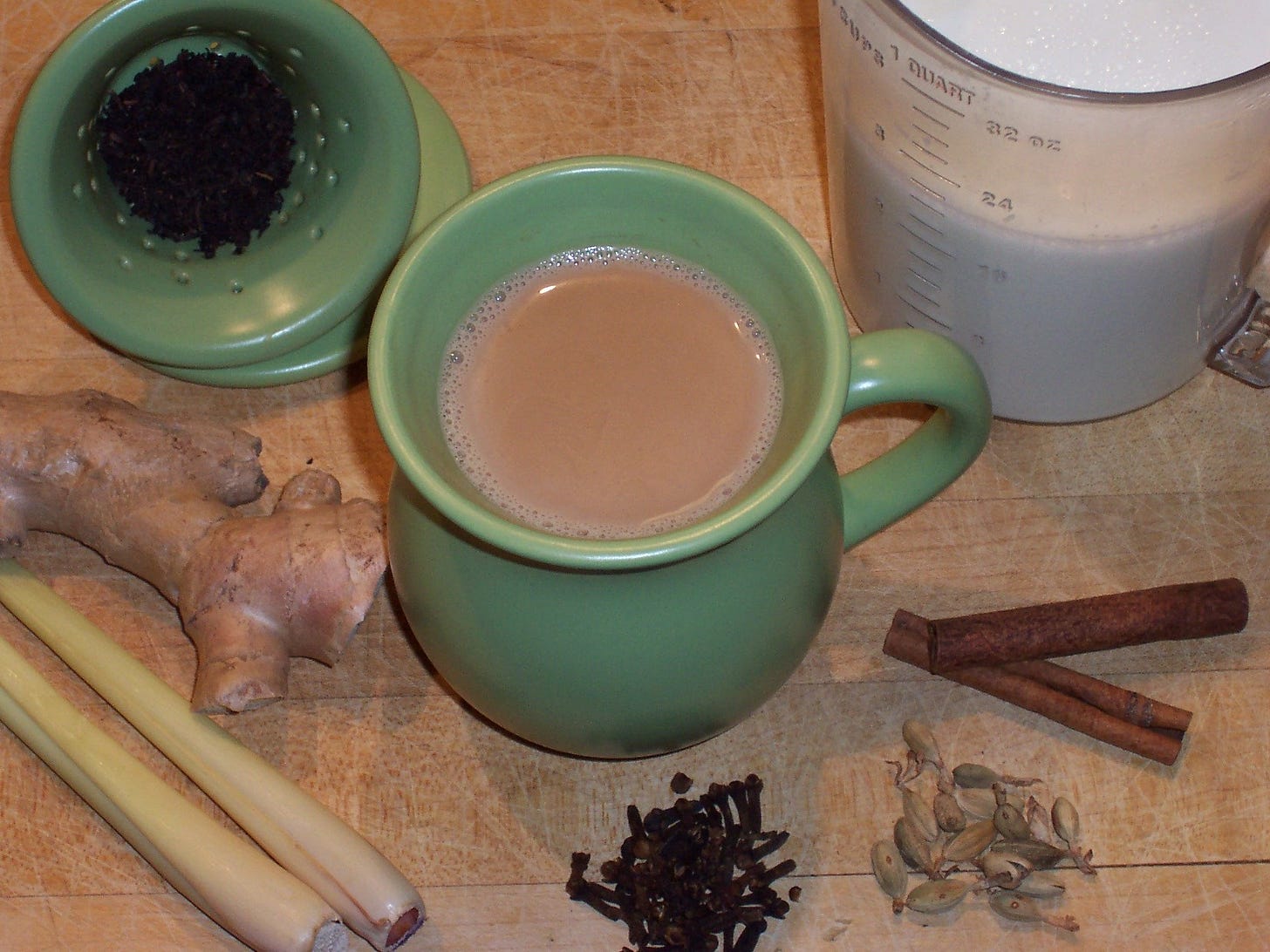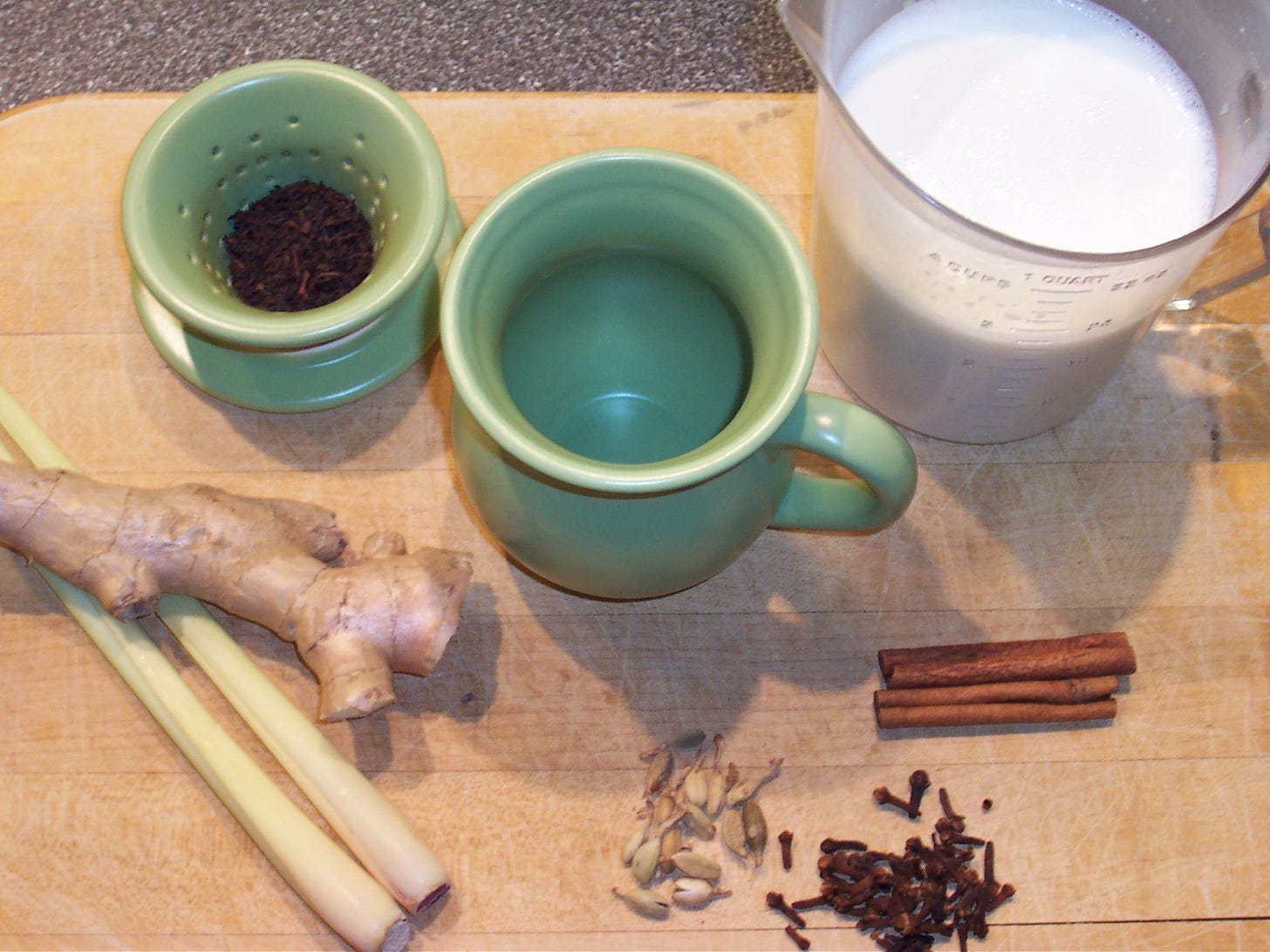As a food writer with a seasonal focus, I am struggling here in Wyoming in April. There are no seasonal foods yet in Alpine; there are no daffodils, crocuses, or flowering trees. It’s still snowing. This afternoon I watched the eclipse as robins skirted the edge of the snow melt, close to the the daffodil buds still tightly wrapped. I sip my chai and wait.
The following article appeared in the Centre Daily Times in 2006 and covered a Slow Food Central Pa event that took place in the Foods Lab on campus where I worked. It’s still the recipe that I use, though now I use decaf black tea. I make a full batch and keep it in the refrigerator to warm up.


"This is the distinctive smell I wake up to every morning in India," said Anar Pitre, as she sniffed the ginger, cloves, cinnamon, and cardamom simmering in a deep pot. “My parents start their day with chai routinely, and so every morning we have a chai brewing pot and whole milk warming pot on the stove by 7 am.” Though far from Pune, a three-mile drive from Mumbai, Pitre brings a bit of India to her kitchen in State College when she brews her own.
“Each household has their own spice blend, called masala, that is distinctive, yet similar. The spices also change with the time of year-- lemongrass is used when people start coughing in winter since a ginger-lemongrass combo has a soothing effect on the throat. It is a great herbal remedy.”
Chai is hot these days and making it from scratch is not difficult. Simmer whole spices like cinnamon, clove, ginger, and cardamom in hot water for a few minutes, and then add milk and a sweetener. Add the tea to the simmering mix and remove from the heat to steep. The combination of spices can include lemongrass, whole peppercorns, star anise, nutmeg—Pitre sometimes adds a sprig of rosemary to her pot. Chai is infinitely adaptable.
The word chai derives from the simple Chinese word “chà,” the word for tea and pronounced “chah”. The word chà endures in many nations, including eastern and central Europe; central, south, and southwest Asia; and northern and eastern Africa, where it means tea with milk.
Tea is the world’s oldest hot beverage, drunk by more people than anything else. A cup of coffee charges you up; a cup of tea comforts you. A cup of chai means you are taking that comfort to the luxury level by creating your own signature masala and spending a few minutes steeping, brewing, and straining. Though there are increasingly more chai mixes, concentrates, and powders available in the hot beverage aisle and at coffee shops, there is no substitute for brewing your own version.
Chai ingredients deconstructed:
Tea—you can use loose black tea or tea bags. Green tea is very astringent, so it is best avoided unless you are seeking a special effect. Tea contains powerful antioxidants that are beneficial to the body.
Ginger—use fresh ginger root to strengthen the digestive and respiratory systems; relieves congestion, soothes sore throats, and prevents motion sickness
Whole cloves—invigorating and restorative; helps colds and flu
Cinnamon sticks—soothes nausea and flatulence
Peppercorns—heat! Adding whole peppercorns will provide an internal warmth
Cardamom—stimulates the mind; considered an aphrodisiac
Lemon Grass—good for colds
Nutmeg—in small amounts, adds rich flavor, aids digestion; large amounts can be toxic
Sweetener—brown sugar, white sugar, honey or your preferred sweetener
Milk—this is one instance where whole milk is beneficial because the fat in the milk provides a smoother vehicle for delivering the many flavors of the spices, but choose your favorite fat level of fresh milk or non-dairy milk.
Chai—Indian Spiced Tea
Choose a few spices from the list above; tasty combinations are ginger, cloves, cinnamon, cardamom or ginger, lemongrass, and clove. Experiment until you find the chai masala that pleases you the most.
Makes three 12-ounce servings
3 cups water
2 slices of fresh ginger root
2 sticks of cinnamon
8 whole cardamom pods, crushed
8 whole cloves
1½ cups whole milk
1-2 tablespoons raw sugar or honey
2 tablespoons loose black tea or three teabags
Put the water into a saucepan. Add the ginger, cinnamon, cardamom, and cloves, and bring to a boil. Cover, turn the heat to low, and simmer for 10 minutes. Add the milk and sugar or honey and bring back to a simmer. Add the tea, cover, and remove from the heat. After two or three minutes strain the chai into a teapot or heat-proof container and serve.





